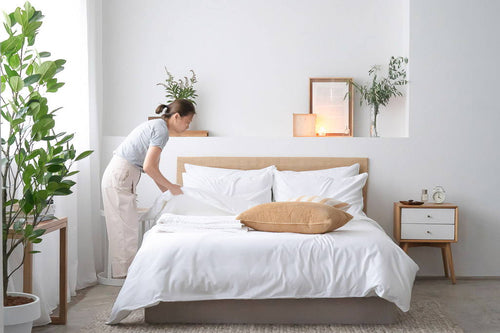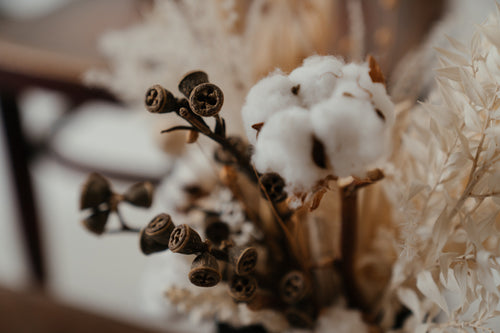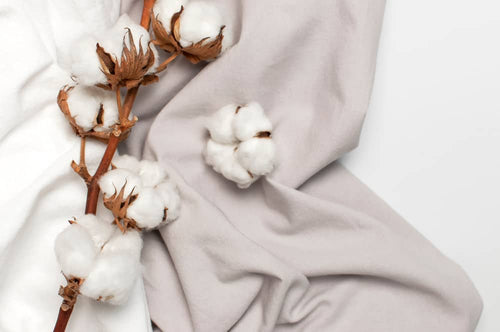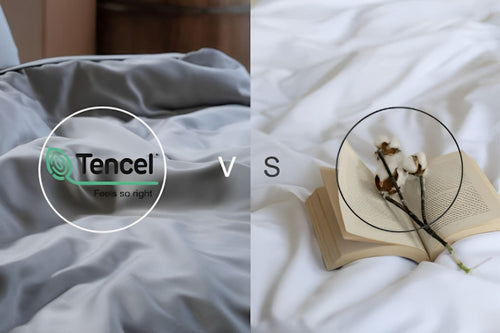At a Glance
Cotton bed sheets are one of the top choices in bedding materials. In this article, we will explore the types of cotton and how to choose the best one for you.
Quick Tips
- Weigh the pros and cons of each variant, even for the best types like Egyptian and Supima.
- Consider the bedsheet thread count, staple length, weaving style, etc.
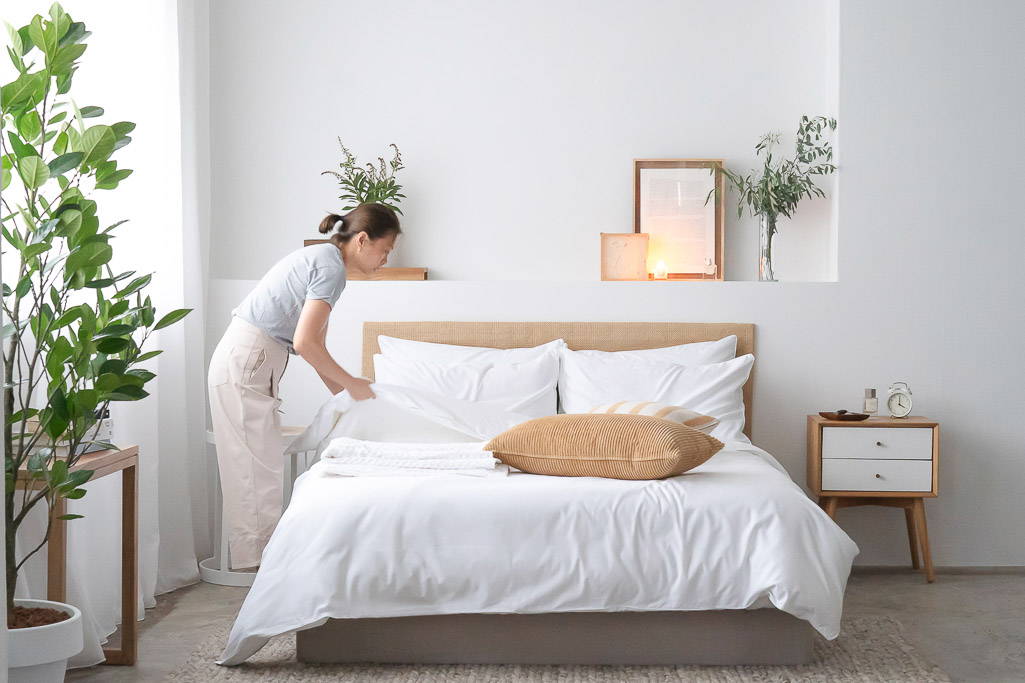
Featuring Weavve's Cotton Deluxe Set in Cloud White
High-quality bed sheets in Singapore create an ideal sleep environment by providing comfort for a good night’s rest. However, not all sheets are the same. Depending on the Singapore bedding material, they can hinder or improve sleep quantity and quality.
Among the best bed sheet materials known for their softness, breathability, and affordability are cotton bed sheets. In this article, we'll dive deeper into the different types of cotton fabrics' names, factors influencing their quality, and what makes them different from non-cotton fabrics.
What Are Cotton Sheets?
This type of bed sheet is made of cotton, a natural fiber from cotton plants that mainly consists of cellulose, an organic compound. It is spun into yarn then woven or knit to produce a soft yet durable fabric.
Although its earliest production dates back to the fifth millennium B.C., cotton fabric is still a widely used material today. In fact, it is considered the most well-known fabric.

Image by Alina Blumberg from Pexels
What Makes Cotton Sheets Popular?
Comfortable
Cotton sheets have longer fibers along with finer threads. These result in a smooth and soft feel that set the scene for a blissful night.
Cooling
Cotton fibers are known to be light and breathable, making them ideal for hot sleepers who want to stay cool and dry throughout the night.
Durable
The molecular structure of cotton gets stronger when wet, making cotton sheets less prone to wear and tear. Extra-long staple cotton especially result in stronger sheets that will not pill or thin but get softer with each wash. Choosing this option means getting to enjoy quality bed sheets for years to come.
6 Different Types of Cotton Bed Sheets

Image by Ron Lach on Pexels
Bedding sets made of cotton come in different types depending on the origin of the cotton fibers, the style of weaving, or methods of treating cotton fabric. Here are some of them:
Egyptian Cotton
Egyptian cotton bed sheets in Singapore are considered a luxury. Egyptian cotton is grown in areas with humid, dry climate. Unlike regular cotton that is harvested by machine, this type of cotton is handpicked. This lets it maintain its extra-long fibers that produce an incredibly soft fabric. It may be hailed as the best cotton type, but there are actually bedding myths surrounding this claim.
Pros
Cons
Softer, stronger, and more flexible than regular cotton
Porous
Breathable
Provides superior comfort
Expensive
Some products labelled as Egyptian cotton sheets are actually knock-offs or blends of Egyptian and regular cotton
Upland Cotton
Bed sheets made of Upland cotton are used for most standard cotton sheets. They are derived from fibers native to the Americas, but they are now the most widely grown cotton globally. This is likely the sheet type you get if the label says “100% cotton.”
Pros
Cons
Made with short fibers, which are rougher, less flexible, and less durable
More prone to pilling and getting coarser over time
MicroCotton
MicroCotton is the trademarked fine cotton produced in India. It was initially for making towels, but it has eventually been used for bedding sheets because of its quick-drying and lint-resistant properties.
Pros
Cons
Made with short fibers, which are rougher, less flexible, and less durable
More prone to pilling and getting coarser over time
Flannel
Flannel is made from brushed cotton, wool, and other materials. Its manufacturing process makes it denser. This creates a heavy yet soft and comfortable fabric that traps body heat, making these sheets a staple for cold winter nights.
Pros
Cons
Pima
Pima cotton bed sheets have long-staple cotton primarily grown in the southwestern part of the United States. Often compared to Egyptian cotton sheets, they are also known for their silky smooth surface and natural sheen.
Pros
Cons
Supima
Supima, a combination of Superior and Pima cotton, is a trademark name for fabric made of fibers and materials woven from American Pima cotton.
Supima cotton sheets come from cotton grown and harvested in the United States. They are also produced with extra-long fibers that make them soft and durable.
Pros
Cons
What Factors Affect the Quality of Cotton Bed Sheets?
Not all cotton sheets are created equal. Besides their material, here are some factors that affect their quality:
Bed Sheet Thread Count
Thread count in a bed sheet can affect your decision when choosing bedding sets since it impacts the texture of bed sheets. Generally, those with higher thread counts are softer since they have thinner and more threads in a square inch of fabric. However, bed sheets high thread count doesn’t always necessarily mean better quality, as it could result in less breathable sheets.
Weave Method

Image by Karolina Grabowska on Pexels
Several weave methods are commonly used to construct cotton fabric for sheets, including sateen and percale. The weave, which involves the number of horizontal and vertical yarns used, affects how the sheets feel against the skin.
Cotton sateen sheet sets are produced using sateen weave. This weave is created by passing vertically facing warp threads over horizontally facing ones, then interlaced. It results in a cotton fabric with a beautiful sheen and buttery softness. On the other hand, the cotton percale weave, also known as the plain weave, is considered a simple weave. During construction, the warp and the weft threads repeatedly cross over and under each other. What makes these sheet sets outstanding is they are durable and breathable.
If you want heavy fabrics that feel silky, sateen is the way to go. But if you prefer bedding with a cool, crisp feel choose percale.
Staple Length
Staple or fiber length makes a difference in the quality, softness, and strength of the sheets. The longer the staple length, the softer the cotton.

Image by Isabelle Taylor on Pexels
Short Staple
Short-staple fibers are the most common type. These measure 1 ⅛-inch. Their softness, strength, and easy maintenance make them great for bed sheets.
Long Staple
Long-staple cotton consists of fibers of 1 ¼-inch. Their longer fiber length results in a smoother surface, so they are a popular choice to make sheets. Additionally, they have fewer exposed fiber ends, which means they’re less prone to pilling or tearing.
Extra-Long Staple
Extra-long staples have 2-inch fibers. They are considered the most luxurious cotton sheets. Compared to the others, they are a more challenging crop. Some of the most famous extra-long-staple cotton plants are Egyptian cotton and Pima cotton.
How Does Cotton Differ From Other Bedding Materials?

Image by TENCEL™
Although cotton is the most popular fabric, it is not the most sustainable. There are other alternatives used to make premium quality bedding sheets.
Bamboo
Bamboo fibers are very long, giving bamboo sheets superior softness and durability. They are also non-absorbent, breathable, and hypoallergenic.
On the flip side, chemicals are used in the manufacturing process. Bamboo sheets are also more expensive than standard Upland cotton.
Linen
Linen sheets are made from the fibers of the flax plant. Their fibers are thicker than cotton’s, which is why they are stronger and more absorbent. However, they need multiple washes before becoming soft and comfortable to use.
Silk
Silk sheets come from fiber produced by silkworms. They offer extreme softness, comfort, and, most importantly, luxury. The downside to this option is its cost. It also requires delicate care.
TENCEL™
TENCEL™ is a brand of all-natural fabric derived from eucalyptus wood pulp. Sheets made of this material are soft, breathable, and moisture-wicking which makes them an excellent choice for cooling bed sheets.
WHICH ONE SHOULD YOU CHOOSE?

Image by cottonbro on Pexels
Sleep is vital for your health, so it simply makes sense to invest in quality bed sheets that allow for a good night’s rest. If you’re wondering if cotton is a good bed sheet material or which cotton is best for bed sheets, the answers depend on your sleeping needs and preferences.
Discover weavve's collection
Weavve’s Cotton Bed Sheets
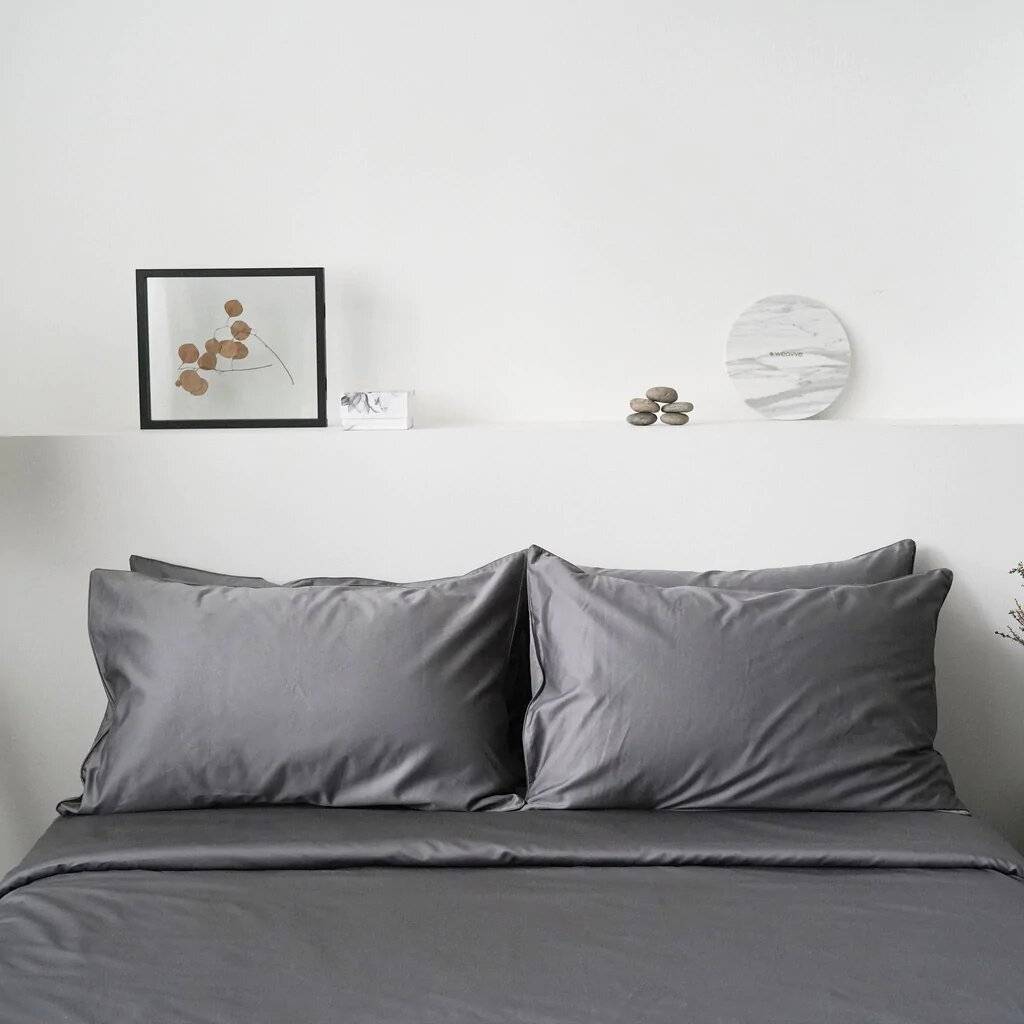
Featuring Weavve’s Cotton Deluxe Set in Persian Grey
Renowned for their stronger, smoother, and lighter fabrics, our cotton bed sets are perfect for those looking for safe and durable bedding. We use extra-long staple cotton fibers spun into finer 100 yarn count and single ply threads (600 thread count). Our sateen weaving method provides that luxurious sheen and smooth feel you'll love!
Shop cotton bedsheets Singapore
TENCEL™ Lyocell sheets

Featuring Weavve’s Lyocell Deluxe Set in Mist Grey
Alternatively, if you prefer silky smooth and cool to the touch sheets, TENCEL™ Lyocell bed sheets may be the choice for you. TENCEL™ Lyocell has many similarities to cotton. They are also strong, smooth, and lighter. What makes them stand out is they are eco-friendly. Starting with the best lyocell fibers (100% Lenzing TENCEL™) spun into the finest 80s yarn count threads, all processes involved in making these sheets are certified free from harmful substances.
Shop TENCEL™ bedsheets Singapore































